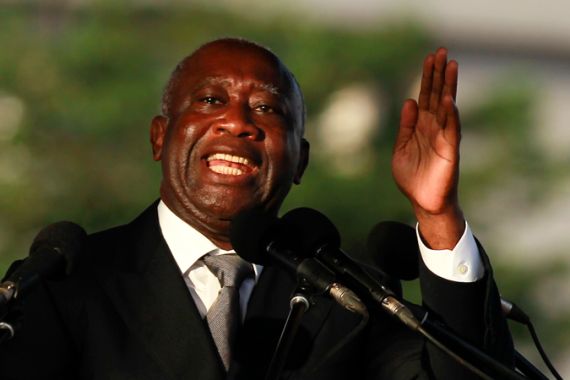Profile: Ivory Coast’s Laurent Gbagbo
The 76-year-old has returned to the country he ruled from 2000 to 2011 after the International Criminal Court in The Hague earlier this year confirmed his war crimes acquittal.

Ivory Coast’s former President Laurent Gbagbo has returned home after nearly a 10-year absence.
The 76-year-old arrived in the economic hub of Abidjan on Thursday on a commercial flight from Brussels after judges at the International Criminal Court (ICC) in The Hague earlier this year confirmed his 2019 acquittal of war crimes and crimes against humanity.
The charges arose from a months-long conflict sparked by Gbagbo’s refusal in late 2010 to accept defeat in a presidential election to his rival Alassane Ouattara, Ivory Coast’s current president.
More than 3,000 people were killed in the fighting between forces loyal to the two men before Gbagbo was arrested in Abidjan in April 2011. He was put under house arrest in the northern town of Korogho, and seven months later, he was handed over to the ICC.
A judge acquitted him in 2019, saying prosecutors had failed to prove their case. The verdict was appealed but upheld in late March, clearing the way for Gbagbo to leave Belgium where he had spent the past two years.
Gbagbo was born in Gagnoa, in southcentral Ivory Coast, on May 31, 1945.
He studied history at the University of Abidjan, before continuing his studies at the Sorbonne in Paris and returning to Abidjan to teach in the Classical College.
A longtime opponent of Ivory Coast’s first president after independence from France, Felix Houphouet-Boigny, Gbagbo spent years fighting for democracy and human rights as part of the opposition – in the early 1970s, he was jailed for two years for “subversive” teachings.
After getting involved in the trade union movement through a teachers’ strike in the early 1980s, Gbagbo went into exile in France, where he set up the Ivorian Popular Front (FPI).
He went into politics in 1990 when a multiparty system was introduced in the West African nation, allowing him to unsuccessfully run against Houphouet-Boigny.
Ten years later, on October 26, 2000, he was elected president under what he himself described as “calamitous” conditions.
Gbagbo defeated General Robert Guei, who had staged a military coup in December 1999 and did not recognise his defeat. Henri Konon Bedie, overthrown by Guei, was barred from the election, as was Ouattara, a former prime minister whose full Ivorian nationality was deliberately cast in doubt. The polls were followed by violence.
In 2002, Gbagbo survived an attempted military coup, but the event triggered a civil war that left the country fragmented between the rebel-held north and government-held south.
In the meantime, the president, whose supporters were accused of carrying out xenophobic attacks against immigrants and those from the north, decided not to hold fresh elections in 2005, when his term came to an end, saying the country was not ready.
A peace accord and power-sharing deal was eventually signed between Gbagbo and Guillaume Soro, commander of the rebels, in 2007. The 2010 poll was supposed to put Ivory Coast back on the path of democracy.
Gbagbo beat Ouattara in the first round of the election, but after the second and final round, the country’s electoral commission declared the former the loser and handed victory to the latter.
However, the country’s constitutional court overturned the electoral commission’s result, declaring Gbagbo the winner, despite the United Nations and the international community recognising Ouattara as the legitimate winner.
The political deadlock led to months of diplomatic pressure, including sanctions to get Gbagbo to stand down, but when he refused, Ivory Coast was plunged into a four-month conflict between forces loyal to Gbagbo and Ouattara.
Today, Gbagbo has been recast in the role of statesman, called upon to help national reconciliation after election-related violence last year left dozens of people dead.
Ouattara, 79, has facilitated his return, issuing his rival with a diplomatic passport and promising him the rewards and status due to ex-presidents.
Gbagbo has said little about what political role he might play back home. He retains strong support among his base of supporters, particularly in the south and the west, with thousands of supporters on Thursday giving the leader nicknamed the “Lion of Africa” a hero’s welcome.
But groups representing the victims of the 2010-11 post-election violence have condemned the “impunity” he has received and said they would protest against his return.
They also point to a 20-year jail sentence Gbagbo was given in absentia for “looting” the Central Bank of West African States during the conflict. Authorities have already hinted that this sentence will be lifted.